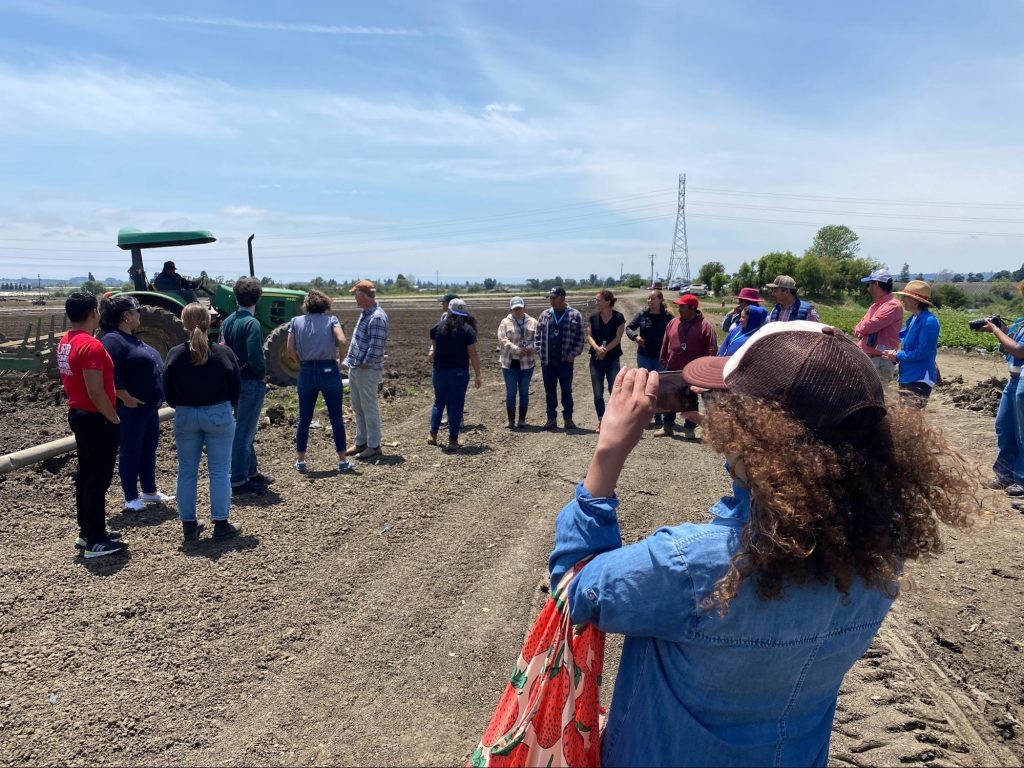Manzanita Capital Collective is A-dae Romero-Briones, Mariela Cedeño, and Anthony Chang, three practitioners who have come together around the north star of the redistribution of land, money and power to tribes, to farmers of color and to other folks working on food and land justice. Their work is to shift capital and to shift power, and they collaborate with Chordata on both of these levels. Tiffany sat down with Anthony Chang to discuss the evolution of their work, and their recent collaboration on Rancho Corralitos / the Watsonville Land Project.
Tiffany: Hi Anthony! I’ve known you for a while now, and I’m excited to highlight our beautiful friendship and collaboration as part of the story of 5 years of Chordata. Will you start by telling us a little bit about what Manzanita Capital Collective is up to these days?
Anthony: Definitely. There’s three main areas in which we do work. There’s our work directly with tribes, farmers of color, and nonprofits working on food and land justice. We are helping mobilize resources for land-based projects, typically in the form of a combination of grants and 0% interest loans or non-extractive finance. So for example, our colleague A-dae, who leads all of our work with tribes and indigenous land stewards, has been coordinating our work with a group of tribal members in Lake County right now to reacquire 20+ acres of ancestral lands for them to re-wild. Or, there’s a farmer of color that we’re working with in Sonoma County whose been farming for 10+ years, that is about to acquire a property that will be the home base for their regenerative farm and seed saving campus. A second bucket is that we support a bunch of community-controlled funds- basically, funds that are often combinations of grants and loans where the folks that are making the decisions are generally people of color coming from and/or accountable to frontline communities. One example is our colleague Mariela has been part of the EFOD (Equitable Food Oriented Development) collaborative since its beginning when she was at Mandela Partners, and where a group of on-the-ground POC food justice practitioners from all over the country – Oakland, El Paso, New Orleans, Durham, Cleveland and more – govern and steward funds to support projects that center community ownership, racial and economic justice, healthy food access, and more. And then the third part is that we partner with family offices, family foundations and other wealth holders to move money when we have aligned goals and objectives. That’s where our work with Chordata most comes in.
Tiffany: I feel like our relationship since the beginning was two-fold. I remember that we started having conversations about decentralized leadership, when you were looking to move (Kitchen Table Advisors) to a more flat organization. Our relationship then deepened when you stepped off a board because of a lot of the racism that you were experiencing and witnessing, and we were in relationship with that organization as well and ended up divesting from them. It was this real point of shared activation of “oh my gosh” even in these kind of woo-woo, economic intervention-y looking spaces, there’s still a hotbed of racism, and it was really cool to be in that fight with you.
Anthony: Absolutely. I feel like there’s like a values connection and there’s also like an energetic piece and an imagining piece that feels really uncommon and special to my relationship to you, Tiffany, and to Chordata. That it was clear that we’re not going to spend time with the status quo. There’s the inside game of, you tinker and you try to reform and then there’s the outside game where you just build your own shit and you do something new. And I feel like that connection of, let’s imagine the new things and do that, that is at the core of how we’ve connected over the years. And our collaboration has really evolved over time. With you, Tiffany, and with Chordata, we were just in relationship for a number of years, not knowing what specific pieces of work might be, but knowing that, well, maybe it’ll be now, maybe it’ll be next month, maybe it’ll be five years from now. We were imagining and staying connected and leaving ourselves open to what kind of exciting work we might do together. And I really appreciate that openness.
Tiffany: My friend and mentor Lillie who I know through Be Present work, she has said that so much of the work is actually that time in between things of cultivating the relationship. Over the pandemic you, Anthony, were coming over and we were going for walks and we were sounding boards for each other about different things. And so it just makes me think of Lillie in that way, that when it comes time to actually do the work, like the People’s Land Fund or like the Manzanita Capital Collective, there’s all of the different beautiful investments that are going to manifest from these waterways that are in your midst. It will just be so easy for us to come in and support at whatever kind of level is needed, because we’ve been putting in that work all the way up until this point.
Anthony: Right. And so recently, that resulted in the very tangible piece of working together on Rancho Corralitos, or what we were calling the Watsonville Land Project, which is collaboration between People’s Land Fund, Kitchen Table Advisors and Dirt Capital Partners to buy a $11.5 million dollar property of organic farmland in Watsonville CA, with the explicit goal of transferring ownership of that land to a group of Latino immigrant organic farmers for around $8 million, recognizing the racial wealth gap, lack of access to capital, all the things. An important piece in that $11.5 million capital stack was $6.5 million of mostly 0% interest debt and some debt that was 1-2% interest. We helped raise the capital for the project. Chordata Capital played an integral role in making the land acquisition happen because something like 30% of the debt came through Chordata Capital clients, which is amazing. We were able to go to other lenders and say, “Hey, this $1.8 million is at 0% interest. Do you want to come in at 0% interest too?”, with the parenthetical “or do you want to be *that person* where the interest you earn – and that you probably don’t need – is basically taking the money out of the pockets of Latino immigrant organic farmers?”
One thing I want to note about our relationship with Chordata overall, that we see in the Watsonville Land Project, is a willingness to experiment and a willingness to come in on something that is beautiful but emergent and figuring things out as we go. There were plenty of folks that said to us “that looks too weird, that looks too complicated, we don’t understand the collaboration, we don’t understand the capital stack”, et cetera. But you and Kate and your clients were just like “cool, land for farmers of color in ways that address the racial wealth gap? Cool, let’s figure it out.”
The way that this project is set up, every dollar of interest that this project pays to lenders comes out of the farmers’ pockets in terms of what they’re going to pay for this land. I just did the quick math on $6.5 million of debt. If it was all at 2% interest, that’s $130,000 a year, and this project will be over four or five years. That’s over half a million dollars that the farmers would pay more for this land. If all of it came at 0%, that’s half a million dollars cheaper to acquire this land. So I think about the importance of the question that we’re asking all of the lenders: “What do you want to happen here? Do you need that money?” If you’re a billion dollar foundation, for example, do you really need these tens of thousands of dollars in interest? And for what?
Tiffany: That is so fucked up. And here’s the other thing that came into my mind, from hearing from these farmers about their median income. It’s between maybe $35,000 annually to, if they are owning their own land they might be bringing in more like $60,000. But then you divide that $130,000 of “low interest” payments divided amongst seven farmers, that’s something like $18,000 in payments a year per person! That’s significantly cutting into what their annual income is. And then you think of, who is receiving this money? It’s the investor class. It’s people or foundations with millions of dollars that don’t need that money. It’s literally wild. Literally taking it out of the mouths of their children that they’re trying to send to college.

Anthony: There’s plenty of folks that we talk to and are in relationship with, especially on the institutional philanthropy side, that just scoff at the idea of 0% interest loans. They scoff like, “What are you talking about? Of course we’re entitled to this financial return.” And to be able to point to these, literally dozens of people who are saying, “No, we are not taking a financial return. We’re getting our principal back, and we’re wanting to support this incredible project.” To be able to have that, is really powerful. To be able to tell other people and really put a mirror to them.
We often talk about “all of our work is in partnership.” All of our work is a collective effort, and we’re all playing our role. And so, all of our work is in support of tribes, land stewards, farmers that are doing this incredible work on the ground. And it’s really important for us to be able to have partners like you, Tiffany, and Kate at Chordata so that we can move together with wealth holders towards this north star. And we’re not only partners, but really values-aligned, like we’re working towards the same goal. I feel like a bunch of folks we work with, we’re like, okay, we’ll work with you because we’re 70% aligned, aligned enough to work on a thing. But I feel like it’s best when we’re 100% aligned on what we’re working towards and the analysis that we have around race, around class, around capitalism, extractive economy and all of these things are shared.
And that reminds me of something else, about the Chordata Cohort, related to the roles that we all play and the trust that can come from relationship. It was really beautiful to get the invitation to join you all at a Chordata Capital cohort gathering and into a space that we could trust would be held well. I think that bringing together a group of wealth holders that are on their journey, in most other cases I’d be skeptical, like “that seems fraught, that could be really harmful in a lot of ways.” But it just felt really different. To come to Boonville for the Chordata Cohort and trust that you and Kate were holding the space in a particular way. And to land in a beautiful place with delicious food and with a group of people that was so warm and to know that you all were doing the work of helping these folks on their journey. And that me and Jessica [Norwood, from Runway] and Aaron [Tanaka, from Center for Economic Democracy] could just come in and be ourselves, share our perspective and experience. Know that you all had done the work to hold the container for these folks, to receive that and to be able to build from there.
Tiffany: It feels so amazing to be able to grow alongside you, Anthony. Both personally and professionally. I’m so grateful for the depth of relationship we have. One of my values is to not have a very firm line between my personal life and my professional life, and I’m just so grateful for these five solid years that we’ve been in business, to be like, cool, we’ve built this with that depth of relationship. Thank you, friend.


